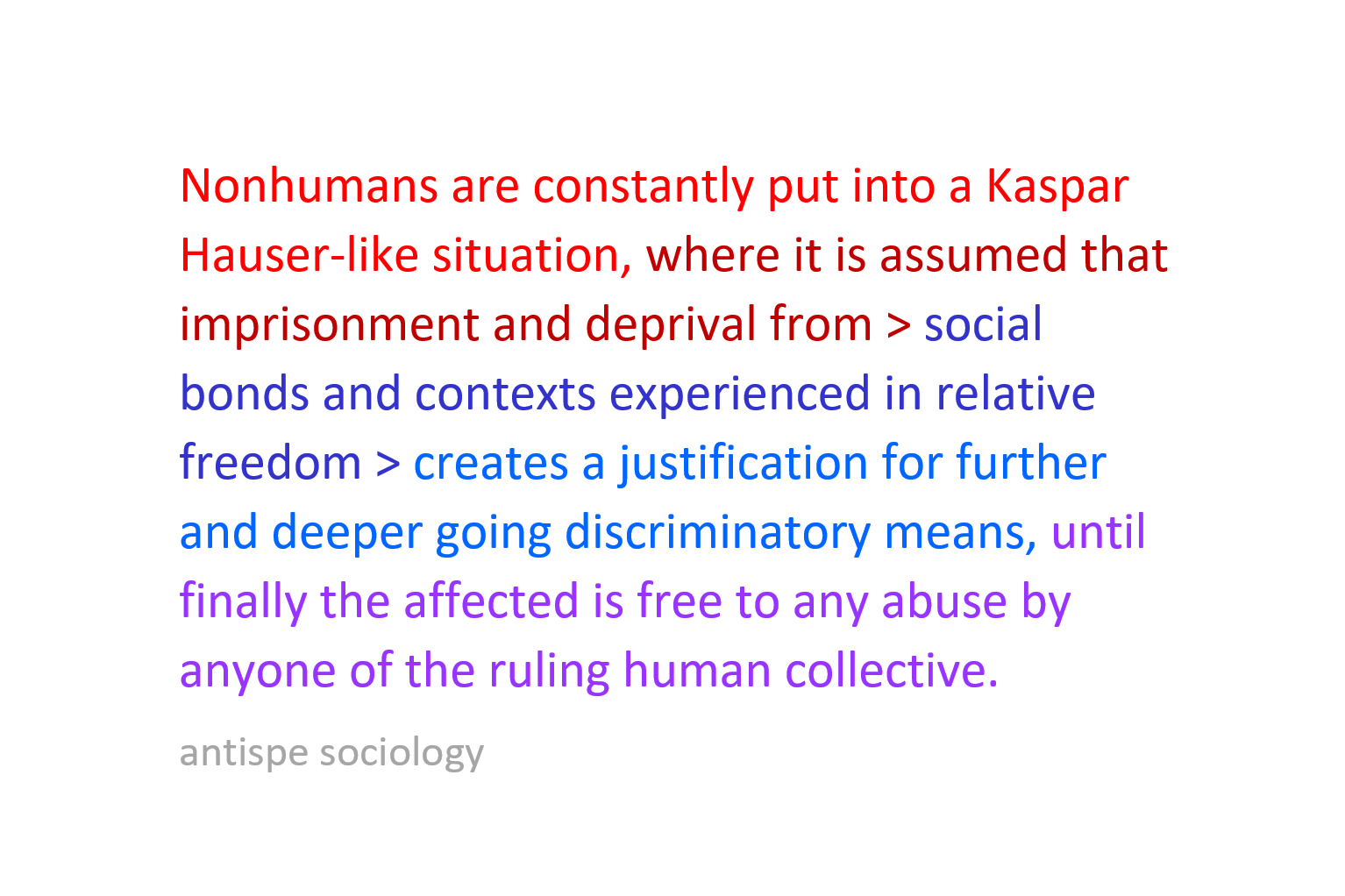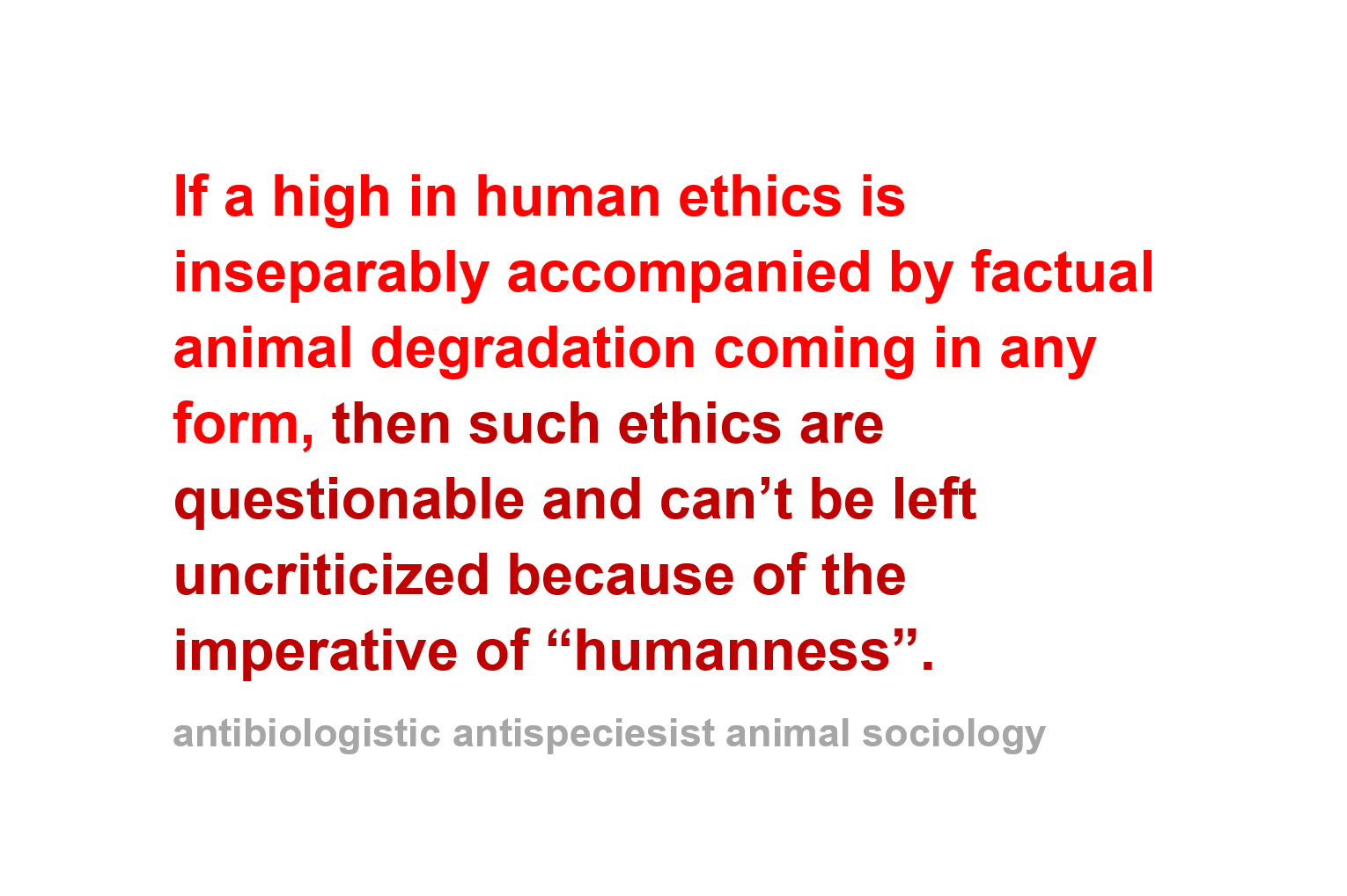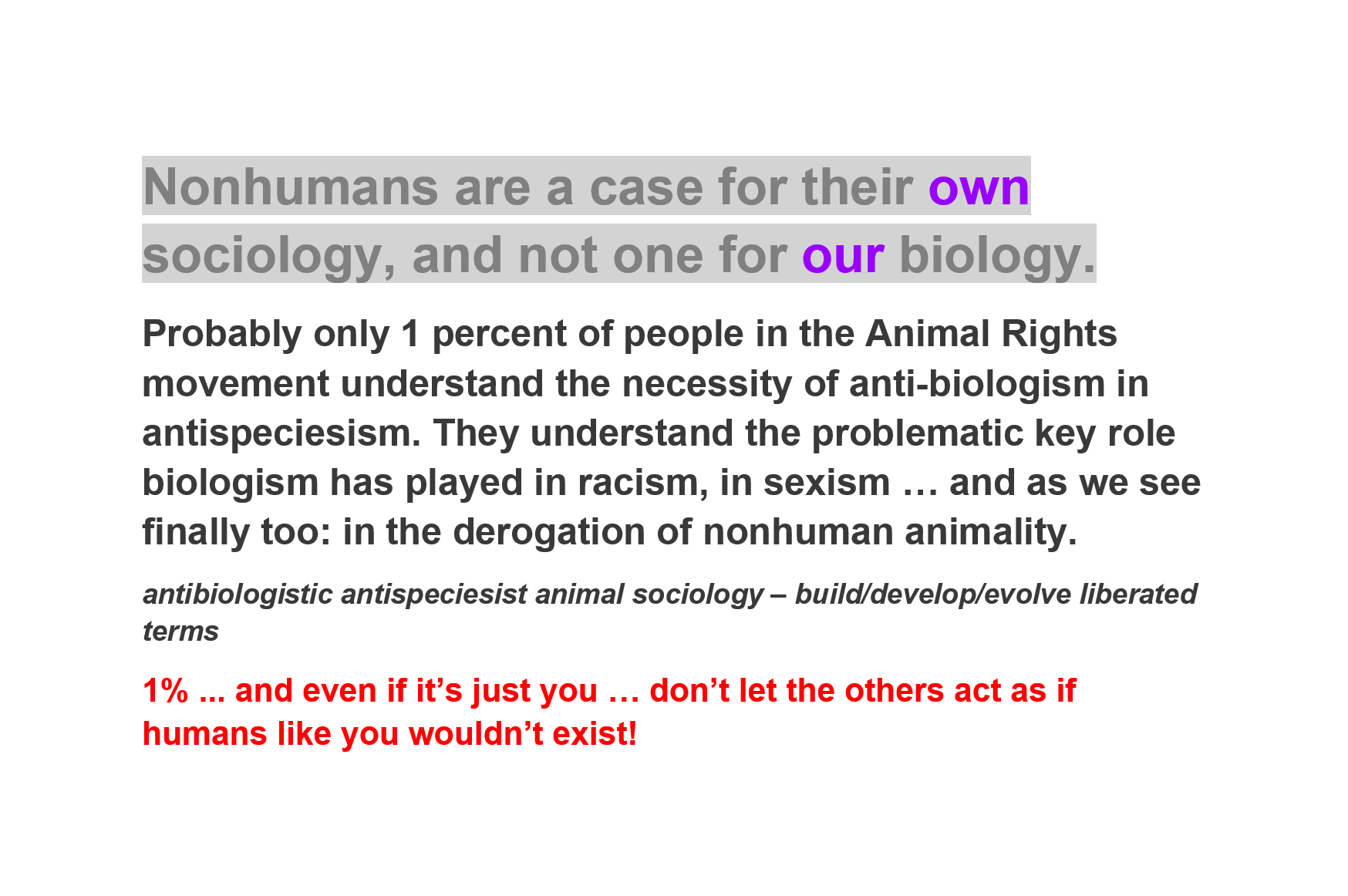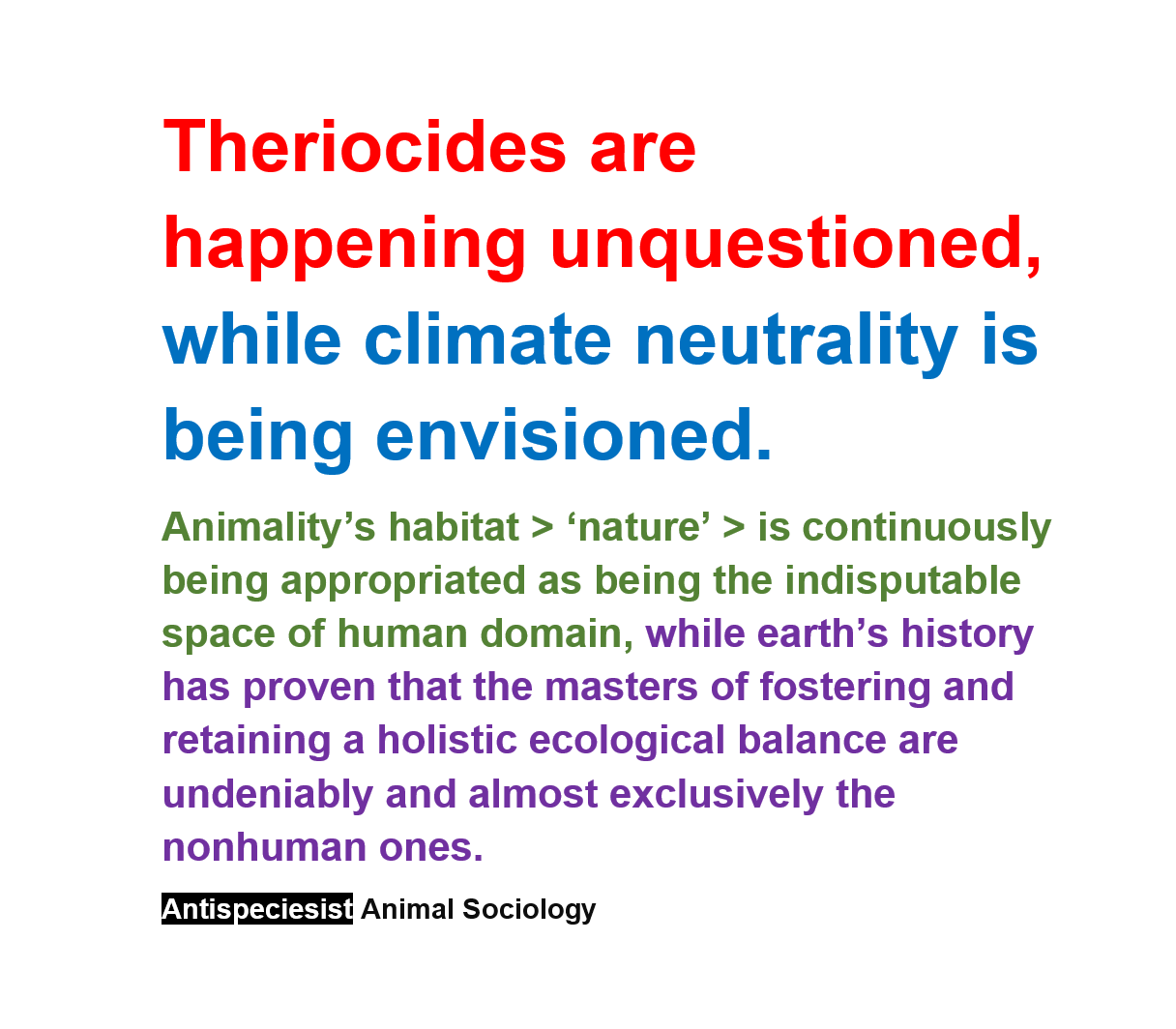
Nonhumans are constantly put into a Kaspar Hauser-like situation, where it is assumed that imprisonment and deprival from > social bonds and contexts experienced in relative freedom > creates a justification for further and deeper going discriminatory means, until finally the affected is free to any abuse by anyone of the ruling human collective.
antispe sociology
Tag Archives: critical of humancentrism
No shared positions on animal and human ethics

If a high in human ethics is inseparably accompanied by factual animal degradation coming in any form, then such ethics are questionable and can’t be left uncriticized because of the imperative of “humanness”.
antibiologistic antispeciesist animal sociology

Human ethics are questionable in how they function within. To use the notion of “humanness” to legitimate objectifications of animal bodies is part of the prolongment of inner human injustice equally as it is injustice towards nonhumans. The forced, expected exclusive solidarity with “the human” separates the logics of socio-ethical communities from one another.
antibiologistic antispeciesist animal sociology
Speciesist objectifications: being considered edible
Edibility in the case of the human-animal-relationship always goes along with the legitimization of “meat eating” via objectification of the animal body. The question should thus not be the distracting: “are we ‘allowed’ to consume nonhuman animal bodies”, but: why are you eating the ‘opposite’ animal subject?
antibiologistic animal sociology
Pluralism works

Criticizing human supremacism while practicing it?
An animal sociology should in our view ideally be a system of full access to animality, i.e. nonhumans are social agents, the old view of “society” as “the strictly human realm” is passe. We live on earth.
It doesn’t make sense otherwise. #animalsociology #antispe
For an antibiologistic antispeciesist animal sociology!
The german artgerecht is a speciesist term

A very biologistic term: “artgerecht”
The German language holds a term that describes that there can be things/actions by humans that are “artgerecht” for nonhuman animal species. That there human actions/treatments that are suitable for a specific species. This term stems mostly from animal agriculture to legitimate their imprisonment and killing of nonhumans and from zoologists classifying nonhuman animals by defining in a reductive way their specific typical “needs” (…).
Humans wouldn’t want to reduce themselves onto categorical needs such as: foraging, territorial behaviour and reproduction. The term “artgerecht” exactly invites you do see nonhumans and their behaviour basically in such reductive way. All behaviour is classified and traced back to some categories humans hold a definitory might over.
Ecological complexity in regards to nonhuman animal sociology is not really a subject for anyone who applies such typical form of biologistic speciesism. The tragic thing is that many people in the German speaking countries use exactly this term when they seek to defend nonhuman animals, so this kind of terminology is not being reflected critically at all. Like they want justice for nonhumans, but they also want to keep pigeonholing nonhumans biologistically in such fundamental ways.
Meaningful, super complex behaviour becomes belittled with clichés of nonhuman species behaviour.
It’s a term that leaves nonhumans in their situations where they are exposed to human definition, when allies use such term, they are not making these settings visible.
***
“Artgerecht” bases much on the concept of “instinct” – which is one of the most questionable concepts to encounter nonhuman animals and animality with
Fragment continued …
“Artgerecht” alsways means the setting is given or influenced by humans.
***
Fragment three
“Artgerecht” always means the setting is given/influenced by humans.
Interesting is how rhetorics, that imply that a nonhuman is or should be treated (…) “artgerecht”, tend to just modify ideas/institutions of domination.
The details for the staged normalcy are always chosen carefully dependent on setting and animal group:
labs – agriculture – captivity – mingling with wildlife.
The idea behind the progress supposedly aimed at by the “artgerecht” treatment/measure (…) always sets forth that a nonhuman is basically instinctual.
This is the old prejudice about nonhuman animality not be self-creative….
Animal Sociology means Animal Sociology

Nonhumans are a case for their own sociology, and not one for our biology.
Probably only 1 percent of people in the Animal Rights movement understand the necessity of anti-biologism in antispeciesism. They understand the problematic key role biologism has played in racism, in sexism … and as we see finally too: in the derogation of nonhuman animality.
antibiologistic antispeciesist animal sociology – build/develop/evolve liberated terms
1% … and even if it’s just you … don’t let the others act as if humans like you wouldn’t exist!
Animal hatred and ecology
 Theriocides are happening unquestioned, while climate neutrality is being envisioned.
Theriocides are happening unquestioned, while climate neutrality is being envisioned.
Animality’s habitat > ‘nature’ > is continuously being appropriated as being the indisputable space of human domain, while earth’s history has proven that the masters of fostering and retaining a holistic ecological balance are undeniably and almost exclusively the nonhuman ones.
Ethical gaps building between injustice and climate
Not every perspective is provable to everyone
Not every perspective is provable to everyone, attitudes are influenced by positions
People don’t see themselves under primarily biological terms, they say their culture and their social life is a proof of being more than just driven by instinctual biologically explainable factors. They say the have their mind, their spirit, their thinking.
A perspectival shift to not see nonhumanity under biological terms primarily, does not need a proof, it needs the will to take another stance towards our environment. Seeing nonhumanity non-biologically and as individuations of Life in its own merits, seems to be unwanted and is treated almost like a form of “blasphemy” against an almighty scientifical system of categorization in our current societies and their Zeitgeists. Stances, positions are however not a matter of proof so much, but much more of choosing a specific perhaps differing standpoint and a perhaps fundamentally different angle of perspective – and that might be one that can’t be proven to the other side, since their outlook is so much predetermined by their own interest.
In the case of evaluating the own interest and the interest of others, operating with proof to privilege one side while disadvantaging the other, forces us to think in one direction only. We assume that it is objectively proven or probable that for instance nonhumans lose less if they die compared to humans, or that it is objectively provable that the reasoning of nonhumans can be behaviouristically determined and would not be autonomous. Proof selects a supposedly objective framework of reference, if you chose another framework of reference you come to a different kind of conclusion: an example, the starkest one perhaps is the different perspective an ecocentric person choses versus a humancentric one at a given moment.
Collectivism, life, speciesism

How the process of life is being reflected
- Regarding human life – some sequences are praised in extremes, while some sequences are faded out, being kept cloaked
- Regarding nonhuman animal life – a taboo-zone within human collectivity , its continuously being suggested that their death is meaningless, compared to ours, considerations of justice are avoided
- Ecology, discussed simply as something that has to sustain “us” humans
Gruppe Messel, Tierautonomie



